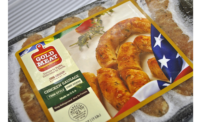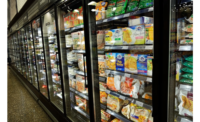Market Trends
Frozen Foods put the Chill in Mealtime
The demand for frozen foods has skyrocketed with more meals served at home.






While frozen foods once were considered a sub-par meal choice and unhealthy newer options are giving consumers what they crave. It is evident that the novel coronavirus has shifted consumer preferences, and frozen foods is one significant market we see change.
The American Frozen Food Institute recently published a survey that found that since the beginning of the pandemic in the United States, the demand for frozen foods has skyrocketed. Overall, 86% of consumers have bought frozen food items since the pandemic began.
Here are six reasons consumers purchased more frozen foods:
- Frozen food has a long shelf-life.
- Consumers want to stock up on frozen food in case of food shortages.
- Purchasing frozen food allows consumers to limit the number of trips they make to the grocery store.
- Frozen food is easy to prepare.
- Making frozen food saves a lot of preparation and cleanup time.
- Many consumers believe that that frozen food is safer than fresh items right now.
The most frequently purchased products were frozen vegetables, meat/poultry and pizza, shows survey results. As well, first-time purchases were highest for meat/poultry, sides, fruit and entrees. Both single-serve and multi-serve entrees increased sales by double digits.
Meal preparation at home is likely a nod to frozen food usage too. Many meals can be made with frozen vegetables, bakery, fruit and meat items.
Frozen Meals and Subscription Services
A new subscription service, bistroMD provides gourmet frozen meals, specifically designed for optimal weight loss. All of the meals are non-perishable, easy to prepare and require no extra trips to the grocery store. The doctor-designed meal delivery plan has breakfast, lunch and dinner options. Consumers can choose a full week program or a work week (five day) program. There are also separate programs designed for women and men. The company’s tagline, “Healthy Looks Good On You” is printed on the side of the meal plan shipping boxes.
Speaking of the shipping boxes, the sub service’s full packaging is 100% recyclable and made from post-consumer and post-industrial materials. The innovative eco-friendly insulation liner that keeps the food frozen was created to transport food with 48-72 hours of thermal protection along with dry ice.
The packaging helps to maintain temperature to preserve food quality and absorb any condensation from the dry ice during transit, while also providing an environmentally responsible disposal option, including curbside collection. The fiber insulation liners can be reused as weed barriers in flowerbeds, to insulate reusable grocery bags or create a cotton-based, hypoallergenic bed for your pet.
Ecommerce subscription plant-based meal kit, Purple Carrot, was introduced in the freezer aisle in partnership with Conagra Foods. Purple Carrot created single-serve meals with the same flavor profiles and nutritional philosophies that are core to its meal kit offering. The four new offerings — Plant-Based Meatball Marinara, Maple Chipotle Veggie Bowl, Fiesta Pepper Bowl and Sweet Corn Elote Bowl — are rolling in to Whole Foods nationwide. The single-serve entrees are a great way to introduce plants into a meal plan, without fully committing to a vegetarian lifestyle by offering a taste of what plant foods can offer.
“We are excited to partner with Purple Carrot on this endeavor,” said Tara Rozalowsky, VP/GM at Conagra Brands. “They have built a large, successful direct to consumer model for plant-based meal solutions and together, we plan to take that equity across the retail space, increasing the access points for flexitarians and plant-based lifestyle enthusiasts to have complete meal solutions, including frozen options that are entirely plant based, vegan and non-GMO comfort foods.”
Purple Carrot started in 2014 to encourage people to eat more plants for their health and the health of the planet.
New Sustainable Materials for Frozen Foods
Charta Global has expanded its APP Foopak Bio Natura portfolio of sustainable, compostable and recyclable food packaging board grades with the addition of a new coated two-sided cupstock paper board. The new board is created for single serve frozen food confection products such as shakes, yogurt, smoothies, cold drinks as well as individual packaged frozen food meals.
The newest addition to the Foopak BioNatura line, the C2S cupstock utilizes APP’s sustainable water-based coating, eliminating the needs of traditional Polyethylene (PE). ISEGA, EN 13432 certified for composability, the product will break down within 12 weeks in an industrial composting facility. And, it is also European Union, EN 13430 certified for commercial and residential recyclability.
The entire Foopak portfolio of board products are FDA-certified and available in multiple kit levels, wet strengths, edge wicking, coatings and calipers/gsm’s for end use. The highly durable surface options are great for intricate graphics and branding. Foopak is also PEFC chain of custody certified, one of the world’s largest global forest certification systems.
SIRANE has launched RePEat, a range of recyclable PE pouches and films. The films (and pouches) are made from pure PE (polyethylene) — including any zip-lock — and so can be recycled anywhere with an LDPE recycling stream.
Mono & laminate structures are available, offering a range of different barriers — meaning RePEat films can be used for frozen food, packaging which requires a high barrier and liquids. It is also suitable for non-food, where no barrier is required.
“RePEat film is a plastic film, but one which can be recycled,” said Simon Balderson, SIRANE MD. “Traditionally, this sort of packaging cannot be recycled, because of the multiple laminate layers, but with RePEat film it can be easily recycled.”
One of the four variants is the RePEat F1(120Mu) mono-layer recyclable PE pouches for non-food and frozen applications where no oxygen barrier is required.
The RePEat pouches and films are part of a range of sustainable packaging solutions offered by Sirane. The company also has Earthfilm and Earthpouch, a paper-based plastic-free packaging solution.
Looking for a reprint of this article?
From high-res PDFs to custom plaques, order your copy today!









